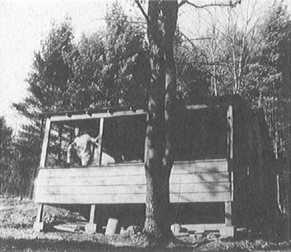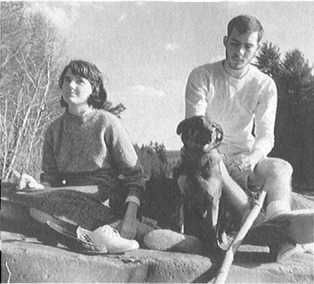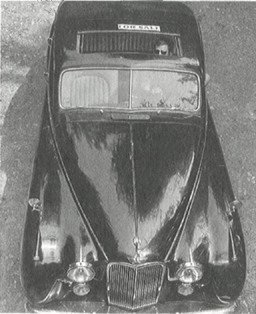Proud Highway:Saga of a Desperate Southern Gentleman (28 page)
Read Proud Highway:Saga of a Desperate Southern Gentleman Online
Authors: Hunter S. Thompson

Drop me a line. And keep away from San Francisco.
Suspiciously:
Hunter
TO KRAIG JUENGER
:
Juenger's mother had been diagnosed with cancer; Thompson's father had died when Hunter was only fourteen.
November 22, 1958
Time & Life Building
Rockefeller Center
New York
Dear Kraig,
Your letter was quite a jolt and it seems a little silly for me to say that I'm sorry to hear about your mother because expressions like that seem to be
out of place except on printed “sympathy cards.” But you know that I'm sorry as hell and I hope it's not as serious as you seem to think. It seems incredible to me that this sort of thing always happens to the people I like bestâI simply can't understand why the useless ones aren't struck down first. But I guess Hemingway was right: “It kills the very good and the very gentle and the very brave indiscriminately. If you are none of these you can be sure it will kill you too, but there will be no special hurry.”
Be sure to let me know how things turn out and rest assured that I
do
understand. My father is no longer with us, you know.
I don't want to sound disappointed over the prospect of your not being able to come to New York during the holidays, but you know damned well that the idea doesn't make me any too happy. But by all means do whatever you feel you should do and let me know what you decide.
Very little is happening here and I sort of talked myself out in the letter I wrote last week. When you calm down a little more be sure to drop me a line. And don't let your imagination run away with you because a hell of a lot of people have had tumors removed without the operations proving fatal. So until I hear from you, stay calm and don't jump until you're sure you've been hit.
Love, Hunter
TO
EDITOR & PUBLISHER
:
Thompson fired off this response to a column claiming that young people weren't interested in journalism careers because its pay scale was so low.
December 7, 1958
57 Perry Street
New York City
Jerome H. Walker
Editor & Publisher
1700 Times Tower
New York City
Dear Sir,
When I read your column of November 29th (“Pay's Good, Come on In”) I fell into a fit of despair and decided to go out the very next day and sign up for unemployment insurance. Since I haven't lost
all
of my self-respect yet I finally decided against it, but I've been boiling about that damned column all week.
So you're worried that journalism isn't getting its share of young talent and you think its because a bunch of embittered old men have spread the
rumor that it's a “poor pay game.” If nothing else, your column makes you a red-hot candidate for The Thompson Trophy for the Most Myopic Analysis of the Year, a dubious honor at best. You and all the rest of the “serious thinkers” on journalism's great wailing wall remind me of a leper standing in a bar, waving a huge sack of money and yelling, “What's wrong with you people? Why don't you want to drink with me? I have enough money, see!”
The leper may not want to admit it but I think he knows why he's no popularity kingâit's just as obvious as the sores on his back. And I think the reason for journalism's shortage of young talent is just as obvious as the fact that most of the newspapers in the country today are overcrowded rest homes for inept hacks. Burial grounds do not attract talent.
In a nutshell, journalism has lost its primary selling points, the very things which used to make salary a secondary factor. The best American journalists have invariably been respected, envied, and often emulated. Traditionally, they've not only held onto their individuality but capitalized on it, not only maintained their self-respect but commanded the respect of others. Why do you think the New York Yankees generally get their pick of the country's young baseball talent? It's not just because they hand out good paychecks.
How many newspapers are there in the country today that actually command the respect of anyone who knows a damned thing about journalism? I'd have a hard time counting ten. And there's where we come to the pith and substance of the whole problem: since journalism has lost its ability to command respect as a profession, it has sunk to the level of “just another job.” Where salary used to be secondary it is now primary. Whereas journalism formerly attracted top talent in
spite of
a generally low salary scale it has now reduced itself to a level where it has to compete with related fields (PR, Advertising, TV, etc.)
on their terms.
And the terms, of course, are almost always monetary, and let's not kid ourselves about the salaries in the top brackets of journalism as compared to comparable ones in advertising, TV, and PR.
So there you have it: journalism, for my money, has nearly tumbled head over heels in its hurry to toss away its integrity and compromise with the public taste, the mass intellect, and the self-sighted demands of profit-hungry advertisers. Now how in the hell do you
expect
to keep on attracting top talent? Sacrificing good men to journalism is like sending William Faulkner to work for
Time
magazine.
Motto: “If you're given a choice between cheap and cheaper, why not learn how to write ad copy and then put yourself on the grey-flannel auction block? There is no god but MONEY!”
As far as I'm concerned, what I've said so far is a pretty thorough condemnation, but incredibly enough there's more. I contend that newspapers,
especially in New York, have become so institutionalized, so complacent, and so blind to their own needs that they think they can afford to play “hard to get” with the young talent they can still attract. I'm speaking out of my own experience here because I've spent about six months looking for a decent newspaper job and I'm about to give up the ghost. And when I say “decent job” I mean one I can be proud of with a paper I respect. There is plenty of money in the world but there are damn few jobs an intelligent man can do without compromising himself intolerably. Everywhere you turn people seem to be warning each other about “the dangerous trend towards standardization” but I have yet to see signs of anyone doing anything about it. I'll bet that if I went to
Fortune
magazine and asked William Whyte
18
himself for a job he'd have me take one of those abominable personality tests he went to so much trouble to warn us about.
Look at the help-wanted ads in the
Times
âtrade papers, house organs. Look at your own ads in
E & P
âone-horse gossip sheets and country weeklies. Ask for a job with a big daily that obviously needs new bloodâ“sorry, we don't need anyone. Don't call us, we'll call you.” Then pick up
E & P
and read your own column again. You people don't need to offer better salaries, all you have to do is raise your damned standards a bit! And as long as 90% of the papers in this country are staffed by complacent hacks those standards are going to stay right where they are. You people have your backs to the wall and you'd better open your eyes in one hell of a hurry. A free press is not indispensable unless it
makes
itself indispensable. So how about cleaning up your house and
then
bellowing about no one wanting to come in?
Cordially,
Hunter S. Thompson
PS: If you know anyone who needs a firebrand critic of sorts, just drop me a line.
TO ANN FRICK
:
During his stint at
Time,
Thompson polished his writing skills by typing
The Great Gatsby
and
A Farewell to Arms
in their entirety, closely studying their sentence structures. Fascinated to learn that Thompson was studying American literature so carefully, Frick wrote him a long letter seeking recommendations for her reading list.
December 19, 1958
Time & Life Building
Rockefeller Center
New York
Dear Ann,
This is a borrowed typewriter and I'll probably make four million mistakes so bear with me and keep your head.
To continue with your questions:
 â¦Â from last week:
Brave New World
(Huxley),
The Great Gatsby
(Fitzgerald),
A Farewell to Arms
(Hemingway),
The Organization Man
(Whyte),
The Best of Everything
(Jaffe)âthis one hardly belongs in the abovementioned company but it's one which would interest any girl who intends to come to New York and look for a job. Actually, there's very little sense in my going on with this list; the ones I've mentioned are books that
nobody
should miss reading, as far as I'm concerned, but I could list at least a hundred more and that would be a little senseless. It's excellent, however, that your mind is beginning to stir a bit and I'll keep that in mind in future letters. We may yet succeed in pulling your mind out of the fog!
My aptitude on dancingâas you put itâhas not changed in several years, primarily because I've had no occasion to even think about it, much less consider changing it. My four years at dancing school served me about as well as my two years of piano lessons and I can't understand how such a wasted childhood could have been so enjoyable. If, however, you feel that I should change on either count, I inviteâand look forward toâyour efforts. I can assure you that I harbor no antipathy toward either the piano or the dance floor. I am indifferent, but not opposed: an excellent attitude for a man in my position, I think.
Things on my “worry list”:
1) money
2) money
3) money after the first three they tend to level out.â¦
4) Worry that I may not be as strong as I think I am and thereby compromise with dull reality and convince myself that my weakness is a sign of “maturity.”
5) Worry that I may never run across anyone whom I think is “right” enough to fall in love with, or perhaps I should say “be happy with.”
6) Worry that I live in a land of semi-educated flagellants (look that one up, it will do you good) who have created and insist on maintaining a “free, equal, standardized, complacent and decaying society”
which frustrates and denies the idea that I should live as I want to live and maintain my self-respect at the same time.
7) The rest of my worries are small and come and go from day to day. What are your “worries”?
Yes, Davison seems to like Vandy. He was co-captain of the Freshman football team and pledged Phi Delt. I shall see him next week when I hustle homeward. I'll be home for a week or two and I'll let you know if there's any chance of my getting to Tallahassee before I return to New York City.
This is about it for now and let me warn you in closing that you are not “as usual” and certainly not “plain.”
Love, Hunter
Â

Thompson at his Catskills cabin.
(P
HOTO BY
H
UNTER
S. T
HOMPSON
;
COURTESY OF
HST C
OLLECTION
)

Thompson with Judy Booth in the Catskills.
(P
HOTO BY
R
OBERT
W. B
ONE
;
COURTESY OF
HST C
OLLECTION
)
